#earnest bennet
Explore tagged Tumblr posts
Text
On opening the door, she perceived her sister and Bingley standing together over the hearth, as if engaged in earnest conversation; and had this led to no suspicion, the faces of both, as they hastily turned round and moved away from each other, would have told it all.
"Pride and Prejudice" - Jane Austen
#book quote#pride and prejudice#jane austen#open door#elizabeth bennet#interruption#jane bennet#mr bingley#hearth#conversation#earnest#suspicion
1 note
·
View note
Text
Started reading Longbourn by Jo Baker and ooft... it's a struggle.
What's billed as 'a reimagining of Pride and Prejudice from the point of view of the servants' according to a quote on the cover is actually the author forcing their modern views onto domestic staff in the Regency era that it seems unlikely they would ever have held.
The narrative primarily follows Sarah (who is named in the original novel which furthers my point that the staff do have a role in it) who seems annoyed when she actually has to actually serve the family who employ her to be... a servant? Yes, to us today the concept of being employed by someone else to wash their clothes, help them dress and serve their food seems.... strange... to say the least, but at the time it was a job like any other and part of the strict hierarchical structure of society where everyone 'knew' their place.
While it is true that the Industrial Revolution saw domestic staff leave positions they held at estates such as Longbourn in droves and move to cities in search of better job opportunities and pay... that really began in earnest after this time (particularly when railways began to be constructed and travel became easier).
One of the servants came from a workhouse and as anyone with even a passing familiarity with the plot of Oliver Twist will understand, if you came from such abject poverty and dismal circumstances, being a servant at a country estate would seem like an amazing life in comparison.
There are also a lot of allusions to slavery which are, in my opinion, clumsily done and forced into the plot in an attempt, I think, by the author to subtly compare the suffering of slaves to the situation of domestic servants. Which is not only misguided but also pretty insensitive (to say the very least) given that tens of millions of human beings were forcibly removed across the Atlantic Ocean to work against their will in unimaginable conditions (if they even survived the Middle Passage) to line the pockets of the rich and to construct the nations which they and their descendants have largely been kept from benefitting economically from to this day... whereas servants in Britain worked for a wage and were (largely) treated well by their employers and had agency (obviously within reason, if they were treated badly they could quit but it would be a risk).
But servants spoke to each other, so masters and mistresses of estates knew that they must treat their staff well, otherwise they would never be able to secure decent help as no servant worth their salt would work for them. I don't dispute it was a tough life! But there were definitely more precarious situations than working an estate such as Longbourn for a family such as the Bennets.
Plus, I question the need for such as a perspective as I would argue that Pride and Prejudice actually does draws attention to the servants. We know the name of both Longbourn's housekeeper, Mrs Hill (who tells Elizabeth and Jane about the letter Mr Bennet received with news on Lydia) and Pemberley's housekeeper, Mrs Reynolds (who has an enormous part to play in improving Elizabeth's opinion of Mr Darcy).
In addition, we learn something of the respective companions of Anne de Bourgh, with Mrs Jenkinson ('in whose appearance there was nothing remarkable, and who was entirely engaged in listening to what she said, and placing a screen in the proper direction before [Anne]'s eyes') and Mrs Annesley ('a genteel, agreeable-looking woman, whose endeavour to introduce some kind of discourse proved her to be more truly well-bred than either [Miss Bingley and Mrs Hurst]').
Servants are present in the original novel. They are not described in detail because a contemporary audience would understand they would have been present, sort of like how modern day novels would not have characters charging their phones up or detailed descriptions of them being used. They're just so commonplace and second nature to us that we understand everyone does those things. and it was similar back then with servants. They weren't callously 'ignored' by Jane Austen; it isn't within the scope of the novel for a reason because Pride and Prejudice focuses on gentry families and their personal relationships with each other... rather than the servants who washed their dirty dresses...
#pride and prejudice#jane austen#jane austen continuations and spin offs#longbourn#cora reads#history#<- albeit very oversimplified#i appreciate trying to include diversity and the historical context of colonialism but this is.. .a mess.. .. .#and also just quite boring. i only care slightly because of the glimpses of the bennets tbh but after the fifth mention of chilblains#i started to zone out. also mrs hill is an absolute dictator omg... feel like it's a bit harsh#and elizabeth is lending servants her books which is nice and all but... ?? very VERY unlikely#i can tell the author did SOME research because beau brummell is mentioned and cecilia by fanny burney. but the vibes are so offffffffffff#i'm waiting for darcy to arrive and idk. give them all one thousand pounds to drag them out of poverty???
76 notes
·
View notes
Text
My Headcanons For Contestants Full Names
Drop yours too if you want!
1st OG Gen
Eva Charlotte Ariti
Owen Grant Bennet
Alejandro Leónel Burromuerto
Katelynn Samaira "Katie" Caridade
Courtney Paloma Cicada-Sadri
Tyler Finnegan Damon
Lashawna Zarina Davis
Lindsey Tia Galilea
Laurencia Inez "Izzy" Happernook
Cody Emmett Jameson-Anderson
Duncan Roy Jeremy
Justin Vincent Kanani
Sadie Karissa Kress
Bridgette Ellis Leasom
Ezekiel Caspian Mallory
Harold Norbert Cheever Doris McGrady V
Gwenaëlle Eloise "Gwen" Oleander
Heather Serina Saimei
Devin Joseph "DJ" Setal
Noah Danial Simamora
Beth Leanne Tremblay
Trent Corbin Verlice
Geoffrey Matthew "Geoff" Vesely
Sierra Chassidy Weber
.
2nd OG Gen
Horrance Scott "Scott" Campbell
Zoella Jacklyn "Zoey" Chancer
Dawn Guinevere Galene
Samuel Addison "Sam" Gallagher
Rudolph Lawrence "Lightning" Jackson
Beverly Dale "B" Kavi
Brick Gabriel McArthur
Dakota Elodie Blaire Milton
Annette Maria "Anne-Maria" Ricci
Eustacia Holland "Staci" Smith
Josephina Briella "Jo" Sutton
Michelangelo Gian "Mike" Testa
Cameron Corderoy Wilkins
.
3rd OG Gen
Sky Catiana Ahenakew
Bernard Tobias "Beardo" Awan
Ashleigh Desiree "Sugar" Berkeley
Rodney Edmund Canyon
David Zachary "Dave" Dhiren
Shawn Fletcher Earnest
Eleanora Emi "Ella" Hikari
Maximus Cain "Max" Mayhem II (I have reasons I promise)
Christopher Marlon "Topher" Lancaster
Leonard Griffin Lawal
Amanda Adele "Amy" Parker
Samantha Saoirse "Samey" Parker
Jasmine Cordelia Powell
Scarlett Jane Sutherland-Pól
.
I took Sky's last name off this Reddit post

.
1st Reboot Gen
Caleb Malcom Ambrosia
Rajesh Aveer "Raj" Ankola
Wayne Remington Côte
Alejandra Isabel "Axel" Espinoza-Moreno
Chase Bradley Gol
Millie Francesca Ikenna
Beauregard David "Bowie" Jackson
Lauren Fawn "Scary Girl" Janina
Damien Josiah Kamara
Mary-Kate "MK" Kasem
Reginald Philip "Ripper" Kensington
Nichelle Simone LaDonna
Priya Faiza Patil
Hezekias Rafael "Zee" Perdomo-Pineda
Emmeline Nicola "Emma" Rancourt
Julianna Fiore "Julia" Winther
.
6 notes
·
View notes
Text
Man I'm still thinking about Mansfield Park 1999... like I do understand some of the criticisms of it but as a story itself it's excellent and even as a adaptation while it falls short in some key moments, in others the choices it makes elevate the original text, imho. Let me try to get my thoughts together on it
TL;DR While they missed the mark on some book characterizations the intelligence with which they approach slavery as well as women's rights far outshines this movie's faults to me. I would recommend it to anyone. 9/10.
I do agree that their characterization of Fanny was off + while I liked movie Fanny and didn't find her to be so far off center as to be 1000% unrecognizable... yeah I wish they'd been better about making her quieter. The moment when she says no to Sir Thomas should be this big thing, because Fanny never sticks up for herself, and here she's been getting in her comments all along, so it cheapens the moment. It's the Lizzie Bennet syndrome, but it's not the worst case that I've ever seen. She is still shown to be disposed to shyness and prone to accept her place in the household as an unequal with a sad sort of resignation... but I wish they'd done it a little better
I also hated the yes and then no to Henry Crawford. Wish they didn't do it. I fully thought watching it that it was a dream sequence + then she woke up in bed I thought it was confirmed and then was so confused when she once again rejected him... it was unnecessary. Any temptation that Fanny has to marry him in the books is more of "I'm immediately suspicious of someone showing interest in me because nobody shows interest in me and I don't trust my gut about him, but everyone in my family has been making my life a living hell about this man + he himself is trying to show me he's changed so now I'm wondering if he's in earnest and it's getting to the point I'm getting worn down and am in danger of breaking" NOT "oooooh I'm undecided" 👎👎 Bad choice
I fully acknowledge that movie Edmund is not really book Edmund but... I hate Edmund in the book, and I didn't mind the fact that when I watched this movie I actually liked him and wanted them to be together. I will say that I have seen some criticism on here saying that the movie portrays him as never in love with Mary and only pursuing her to please his father and I don't think that's true. While it's clear that Fanny is more consistently in his thoughts in the movie than in the book, I read it as a situation where he's into Fanny but he's telling himself he's not because he's been raised to think of her as his sister (and is in fact her 1st cousin...) and this is just the relationship they've always enjoyed. When he meets Mary, I think the consideration that she's a more acceptable match to his father is certainly turning in the back of his mind, but I don't think that's the only thing fueling his actions. I do think he is shown to be in love with her- while there are glimpses of affection towards Fanny, he is not egregiously moping after her while having Mary on his arm. When he rejects Mary at the end Johnny Lee Miller's performance highlights the fact that he really did think she was a different person and he really was heartbroken when he realized that she was exactly who she said she was (I did have to LOL at this, as I did in the book bc like. Edmund. She was very clear about who she was. She never lied to you, you were always the one lying to yourself from day one, but I digress. In fairness he was also clear about who he was to Mary from day one, they each had mutual delusions about being able to fix the other). His affections for both women were genuine, he only considered himself as pursuing Mary however, and persuaded himself that he felt only familial love for Fanny.
I gather that some people feel offended that they make slavery such a big thing in this movie and explicitly tying Sir Thomas into racial & sexual violence... sorry I guess, but I think it's brilliant and intelligent. I also think that this is perfectly in line with the book, just taking it up 10 notches. Now, I don't really know anything about Jane Austen's life or what she believed in, but at same time, she made the choice when she wrote the novel to explicitly tie the family's fortune to Antigua. None of her other rich people have fortunes in the Caribbean. It's silly to pretend like she wouldn't know that having a plantation in Antigua means slavery. This was a talking point in British society in her time period. And we are so clearly supposed to read the Bertram's critically. Jane Austen is never explicit, but I don't think it goes against the novel to tie slavery into her criticism of British society.
And the people that just don't want to think of the Bertrams as enslavers... tough. Sir Thomas is an enslaver. Tom's sketchbook scene elevates the story greatly. It's not only the truth of the situation it's also very connected to the emotional core of the film to me- both Edmund and Fanny are trying to hold on to a sense of integrity in a world that seems determined to take it from them. I think that this is very true of the novel- but the movie (rightfully in my opinion) downplays things that simply would not resonate with modern audiences (like the whole oooh racy theater is morally wrong) and highlights slavery. And I might add that they do this very artfully. There are no grand speeches- when Mary is making her plans at the end and hoping that Tom dies so Edmund gets the inheritance, the movie does not need to spell out what a trap that wealth is. The suggestion that Tom ne'er-do-well nature is born from a deep disgust for the horrors he's seen in Antigua and specifically the side of his father he's seen in Antigua (things the "good son" Edmund has been sheltered from by the sheer luck of being born a second son) is an excellent take in my opinion and the movie adds this weight to the story in very few scenes.
Neither does the movie try and give you false answers either. Whatever disgust Tom feels... it hasn't made him an abolitionist. Whatever shame Sir Thomas feels... It's not enough. He doesn't renounce that wealth. No one does. Edmund and Fanny are just lucky enough to be in a situation where they can carve out a space for themselves in society where they can enjoy the trickle down effect of imperialism without actually having to be on the plantation enforcing that violence. From beginning to end the wealth that sustains the Bertram family is built on moral corruption of the highest degree and the movie does not shy away from that and neither does it fix it, which I think is commendable, and very real to the lived experience of people at an imperial core.
I feel the same way about the trap that Fanny is trying to dance around. There are no easy answers. Her mother married for love and is impoverished and miserable. Her cousin married for money and is deeply unfulfilled and miserable. Neither of them can get out. They're not financially independent. In her position how can she stay single for forever? She's just trying to keep her integrity and through luck she is able to, but I don't think the movie tries to push easy answers about the situation that the other women in this story are in.
8 notes
·
View notes
Text
Northanger Abbey Readthrough Ch 14
PEOPLE THIS IS THE BEST CHAPTER EVER!!!! We have reached the pinnacle of Tilney awesomeness...
my heroine was most unnaturally able to fulfil her engagement, though it was made with the hero himself. This always makes me think of Evelina by Fanny Burney, where the poor heroine always is taken places she doesn't want to go. Luckily for us, the country walk is actually happening! No Thorpes! No rain! Just charming Tilneys.
One of the best earnest quotes in Austen has happened!:
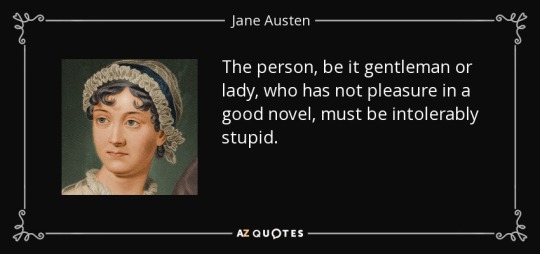
The narrator has taken more of a back seat at this point, but here we have the hero of the novel, openly admitting that not only does he read novels, but he loves them. Henry also seems to understand that Catherine has been mocked about this before, he's very overt in his appreciation of novels. And he calls on her to be proud of him for stealing a novel from his sister, which is just... 🥰🥰🥰 "I am proud when I reflect on it, and I think it must establish me in your good opinion.”
Now is Tilney a little pedantic? Yes. But I find it cute. Sue me.
"...But I really thought before, young men despised novels amazingly.” “It is amazingly; it may well suggest amazement if they do—for they read nearly as many as women.
Catherine has picked up a lot of language from Isabella and Mr. Tilney is subtlety (and not so subtlety) correcting it.
“Henry,” said Miss Tilney, “you are very impertinent. Miss Morland, he is treating you exactly as he does his sister. He is forever finding fault with me, for some incorrectness of language, and now he is taking the same liberty with you. The word ‘nicest,’ as you used it, did not suit him; and you had better change it as soon as you can, or we shall be overpowered with Johnson and Blair all the rest of the way.”...
“Very true,” said Henry, “and this is a very nice day, and we are taking a very nice walk, and you are two very nice young ladies. Oh! It is a very nice word indeed! It does for everything. Originally perhaps it was applied only to express neatness, propriety, delicacy, or refinement—people were nice in their dress, in their sentiments, or their choice. But now every commendation on every subject is comprised in that one word.”
Henry is pointing out both overuse of the word nice and meaning drift. You see a lot of meaning drift comparing Austen's language to ours, words like wonderful, awful, interest, etc. Nice apparently used to mean something close to "neat" and now it means "pleasant" and Henry Tilney is in a battle to preserve it. Well sorry, Mr. Tilney, but you lost. He has a point though, the overuse of a word entirely dilutes it's meaning and can make it basically mean nothing at all.
I love Catherine's speech about history:
The quarrels of popes and kings, with wars or pestilences, in every page; the men all so good for nothing, and hardly any women at all—it is very tiresome: and yet I often think it odd that it should be so dull, for a great deal of it must be invention. The speeches that are put into the heroes’ mouths, their thoughts and designs—the chief of all this must be invention, and invention is what delights me in other books.
She's so right here!
Now while Catherine does spend a lot of time in awe of Henry Tilney and his wit, she does stand on her own opinions. She asserts that "torment" and "instruct" are synonymous and to borrow the phrase of another Austen woman, she will not be laughed out of her opinion! (Jane Bennet, P&P)
Eleanor and Henry soon begin to talk about the picturesque, and from the clues it seems they have opinions similar to Marianne Dashwood and her love of dead leaves. This section is the one I see most quoted by those who think Catherine is too stupid for Henry Tilney or that he is distasteful for wanting to marry an ignorant girl.
I will first point out that ignorance is not equal to stupidity, Catherine is eager to learn. Also, I doubt Henry would have anything to do with the vapid Isabella Thorpe. Catherine may be ignorant about drawing and have trouble with discerning motives, but she is in no way an idiot. If anything, Austen is mocking this sentiment:
Where people wish to attach, they should always be ignorant. To come with a well-informed mind is to come with an inability of administering to the vanity of others, which a sensible person would always wish to avoid. A woman especially, if she have the misfortune of knowing anything, should conceal it as well as she can.
But Catherine did not know her own advantages—did not know that a good-looking girl, with an affectionate heart and a very ignorant mind, cannot fail of attracting a clever young man, unless circumstances are particularly untoward.
Does Henry enjoy being admired by Catherine in all his wit and knowledge? Undoubtedly, yes. But he also loves hanging around Eleanor who is just as intelligent as him (riot fears aside). The chief attraction here is not the ignorance. It's primarily the honesty. Here again we have Catherine fully prepared to admit that she doesn't like reading history and that she knows nothing of drawing. She doesn't pretend, she is a creature of no disguise.
Now we get to see Henry making very suggestive statements that go right over Catherine's poor head:
"...Miss Morland is not used to your odd ways.” “I shall be most happy to make her better acquainted with them.” “No doubt; but that is no explanation of the present.”
No doubt! Eleanor is shipping this couple hard. Good for her.
It was no effort to Catherine to believe that Henry Tilney could never be wrong.
Oh Catherine, you've got it bad.
We hear from an Isabella clone (her younger sister), who was left behind from the Clifton Scheme, she is with two of the sweetest girls in the world, who had been her dear friends all the morning and says:
“They set off at eight this morning,” said Miss Anne, “and I am sure I do not envy them their drive. I think you and I are very well off to be out of the scrape. It must be the dullest thing in the world, for there is not a soul at Clifton at this time of year. Belle went with your brother, and John drove Maria.”
Girl, your speech is dripping with envy so much that even Catherine Morland, our intrepid heroine, realizes that you spouting bullshit.
I will give like, 1 half point to Thorpe for actually helping Isabella out and driving his sister to Clifton. But I award it very begrudgingly.
#northanger abbey#northanger abbey readthrough#catherine morland#henry tilney#the best chapter ever#I wait until I reach it#It is wonderful
65 notes
·
View notes
Note
*Amy from brooklyn nine-nine hummas meme* Nothing Much To Do and Lovely Little Losers... thoughts?
haha basically its the 10 year anniversery of NMTD and I just reread your fic of it and idk I wanted to know if you had any thoughts on it? There's just something so special ??? about 2014 fictional baby gays on youtube :') and i cannot even begin to tell you how happy it made me when I found your NMTD fic a couple years ago <3
Oh hey, blast from the past! That whole series really compelled me. I had no idea it was ten years ago! I definitely mainlined the entire thing while sick, but turns out that was...also eight years ago, oh my god I am so old my bones are dust and I speak the ancient language of the trees.
I feel like it in some ways spiritually sprang from the same well as the Lizzie Bennet diaries (classics but make it vlogs!) but (and your mileage may of course vary) I appreciate a lot that the characters never got in-universe famous or successful for their videos and never got any opportunities from it; they were very much just teens screwing around on camera, in a way that, at its best, felt enjoyably natural.
Much Ado is probably my favorite Shakespeare comedy (narrowly beating out Twelfth Night, which gets points for queerness but loses points because it's VERY messy and less kind and not as overtly feminist as Much Ado; gotta love a play where the main conflicts resolve bc a character chooses to BELIEVE WOMEN) so I may be a little biassed, but I also think the source material creates a lot of opportunities for fun silliness, and the layers of intrigue worked well as vlogs. I love how the love letters were adapted into earnest ukulele songs. The high-stakes drama of Much Ado (Hero will be ruined by Claudio's accusations!) really worked for me as teen drama (Hero's birthday party will be ruined by Claudio's accusations!)
Lovely Little Losers I have somewhat fewer thoughts on, since I don't think I've even read or seen Love's Labor's Lost. I remember the sequel being more ambitious but also messier, which I think is fair for a sequel. I remember being relieved at the ending.
I never really "see myself" in a fictional character but I could identify a little with Balthazar, this shy, music-loving kid who was at his most comfortable cracking jokes with someone he's close to and who really has to force himself to engage in conflict. The archetype of "guy who plays the instruments for his friends' secret love confessions" was not factually resonant to my high school experiences but damn if it didn't produce its own sort of resonance in my head.
idk, I hope the Candle Wasters are doing well!
11 notes
·
View notes
Text
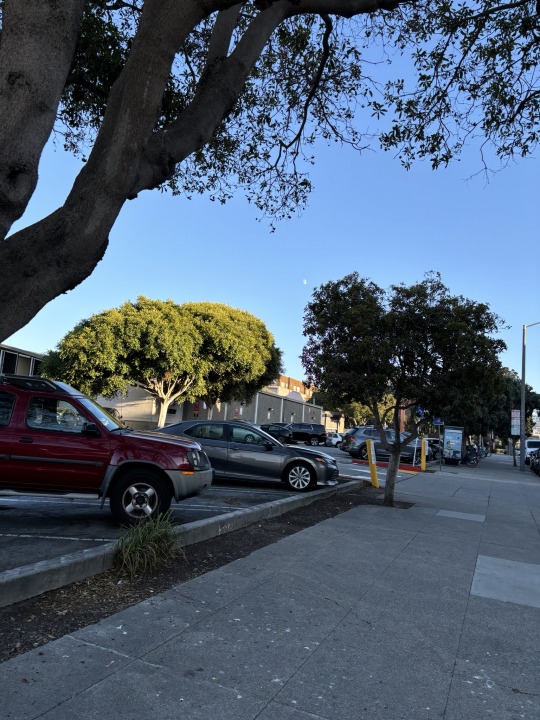
wuz still trynna keep on sleeping - well before that - the foto but now - trynna remember - oh yah a tumblr poetry community - where wee rote crappy poetry by the drivel -thats t not others - once upon a time like tony bennet or straight dire - and a line by mary oliver - t nobody unnastands when u rhyme w the lyrics ur lissening to on the headphonz or referencing a private email - and the crows swoop - a kitty good and always inna mix - last night some raccoons hissing and snarling on rooftops
anyway a moon thru evening and night
and so many once upon a times
or wuz that mary shelley
its that kinda morning - u know the usual - wuz thinking of the importance of earnest birdsong - did we ritez about that yesterday or r my tenses confused
so anywhat if u need some orientating - itz frog friday in tumbler fer instance its september (waaaaaat?!!!!!)
still morning
hallelujah
anyway
16 notes
·
View notes
Text
The Hour, the Spot, the Look, the Words Chapter Commentary
Chapter Twenty-Eight: Safe
So, as stated in the author's note, this is super old and written before I'd really nailed down my Fitzwilliam Rules (when Elizabeth stops calling him Mr. Darcy and starts calling him Fitzwilliam). I've since decided that she gets to that point once the stress of telling her parents has been removed. ...FASCINATING INFORMATION, COURTNEY, THANK YOU.
She could accept that Mr. Darcy did not know the hour, or the spot, or the look, or the words that made him fall in love. You may have guessed, from the title of this work, that the whole "hour, spot, look, words" passage is one of my favorites in all of Austen. Story time: the birthday after I first started dating Jake, mere months into the relationship, he got me a scarf with that section on it. He knew I loved Pride and Prejudice, but didn't know how much I loved that part in particular. Just imagine how hard I had to work to keep it together, OMG. But it was then, dear reader, that I knew I would marry him one day. She could not pinpoint the moment it had happened for her, either.
But she was bold enough (and vain enough) to press him further.
“When did you realize that you were in some danger, at least?”
He smiled. “When you spoke about poetry driving away love.” I LOVE this part of the book because Darcy is being flirty and he's so obviously charmed, meanwhile Elizabeth is trying to be sassy with him while also desperately trying to distract everyone from how terrible Mrs. Bennet is. AMAZING.
She laughed, oddly delighted. “That is what did the mischief?”
“It was amusing.” He shrugged. “I had admired you before then, but it was that which made me feel that I might be in trouble.”
“An odd thing to desire, someone to argue with.”
“Someone to challenge me. It is tedious, being agreed with constantly.”I imagine, being fabulously rich and handsome, that it's a constant stream of Sir William Lucases and Caroline Bingleys approaching Darcy. That can only contribute to his unwillingness to make an effort with people outside of his little circle. ...I feel like these commentaries are my Darcy Apologist Tour sometimes, but I've spent two decades reading terrible takes and I've apparently reached my limit. (Once again, the fact that Darcy's character is good and that he is usually not an unpleasant jerk is shown to us through Bingley, Mrs. Reynolds, and Georgiana. Like... that's the point. He's a good person behaving badly in PARTS of the book. We're supposed to contrast this with characters like Wickham and even Mr. Bennet, who get presented glowingly through Elizabeth's eyes at first but who are actually jerks. And here's the big one: we're ALSO supposed to compare Darcy to Elizabeth, a good person behaving badly in PARTS of the book. ...I'm beating my head against the wall at this point.)
“And so all that time I spent trying to provoke you at Netherfield--”
“You were merely hastening the inevitable.”
“I thought I would drive you off with my sauciness, and all I did was draw you in.”
“I can be contrary in that way.”
“I had assumed that it was the perfect way to make you hate me.”
“It all but guaranteed the opposite.”
“I was not as clever as I thought.”
“Or I am more paradoxical than you anticipated.” These last two lines of dialogue are a convoluted inside joke not funny to anyone but Rhi and me, and I maybe should have edited them out for broader consumption, but I like to keep these older pieces intact for my own archival purposes. And honestly, I originally wrote this for her, so all of the rest of you will just have to deal with it. ;)
“I am glad of it.”
It was a vulnerable moment for Elizabeth, who preferred joking to earnestness. DO YOU HEAR THAT, SIR WALTER SCOTT??? But she was glad that this great, important, good man loved in her that which was often seen as brazen, who saw her as she was and wanted all of it. Siiiiiigh.
She smiled, and he smiled, and they continued their walk, arm in arm.
Nothing new had been said. She had already teased him about his being attracted to her impertinence. So why did it feel different now? Was it hearing her own words being spoken back to her? He had remembered her line about the poetry - something offhand she had said to distract everyone from her mother. She had never imagined that he would tuck it away.
Was it admitting to him that she was grateful that he loved her still, despite their peculiarly contentious history, so full of misinterpretation and confusion?
She thought that was probably it. There were very few people she was truly serious with; she preferred to hide behind her laughter and her jokes, sociable and friendly but private. Her only real confidante was Jane, and how much had she kept even from her sister this year?I think this is key with Elizabeth, and something that gets glossed over a lot.
But she and Mr. Darcy knew each other's family secrets. They kept each other's confidences. A perverse sort of intimacy had sprung up between them long ago. This is a major reason why they're - by far - my favorite Austen couple. They have a weirdly close (and arguably inappropriate) connection before Elizabeth even likes him. It's such an interesting dynamic.
She felt safe with him: safe to trust him with her secrets, safe to admit things that made her feel exposed and defenseless, safe to be herself around him. He knew the worst of her and loved her anyway. Who would have thought? The scene between them after she gets Jane's letters is so important. She just... spills everything to Darcy right there. She didn't have to. She could have lied. We see her lying outright to both her father and Jane! But she didn't, because she loves him they've got that connection I just mentioned.
She squeezed his arm and leaned against him. He looked down at her and smiled.
Elizabeth could not wait to begin her life with this man.
6 notes
·
View notes
Text
The Mansfield House Yearbook: Volume IX
Alexander and Theophilus - well, mostly Alexander - have decided to throw a party, to celebrate their recent engagement, and have invited their nearest and dearest, including Frederica, who's getting her first taste of uni life.
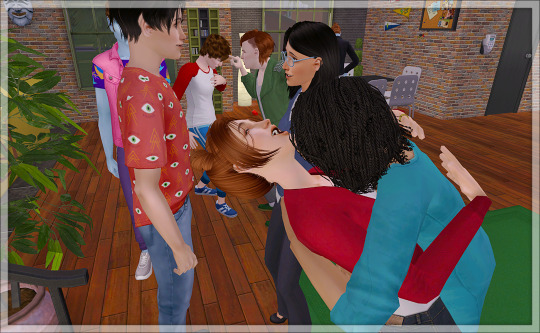
Unfortunately, the guests aren't behaving themselves with any decorum. The very-married Eleanor and the recently-engaged Hester can't resist a smooch, for old-times' sake. And the family feud between Jasper and Bennet is unabated. It's such a shame, as they were so close as children, but Jasper can't contain his disappointment that his brother is still toying with Sophia behind Thomas's back.
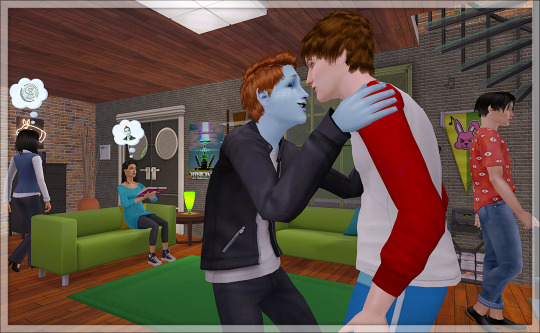
Good-hearted Alexander can't bear for his brothers to be at odds, and just wishes they could put their differences behind them.
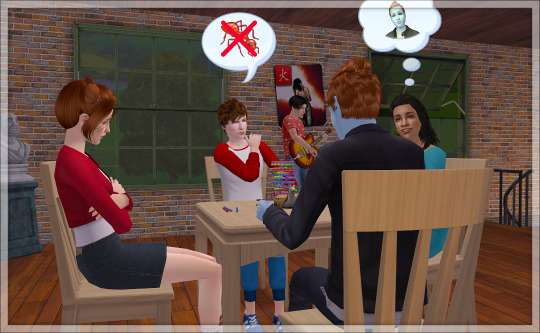
He really wants everyone to just be friends. Maybe a light-hearted game of Don't Wake the Llama will do the trick?
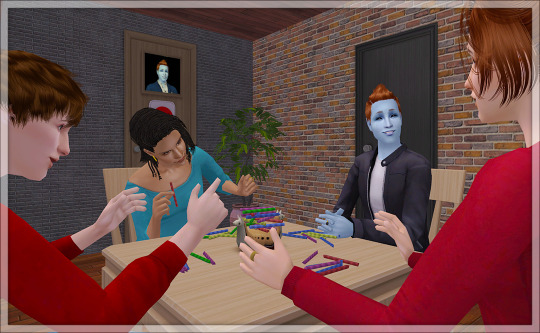
That's better!
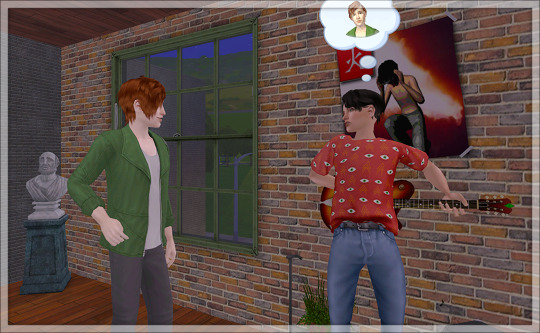
Meanwhile, Edward treats them to a display of his guitar-playing expertise. Knowing that his cousin Jasper is a maestro on the instrument is a little intimidating.
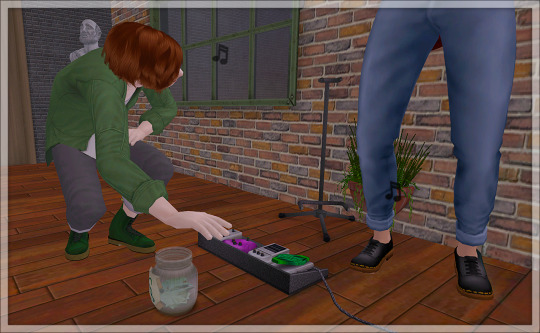
But wow! He approves, and it means the world to Edward.
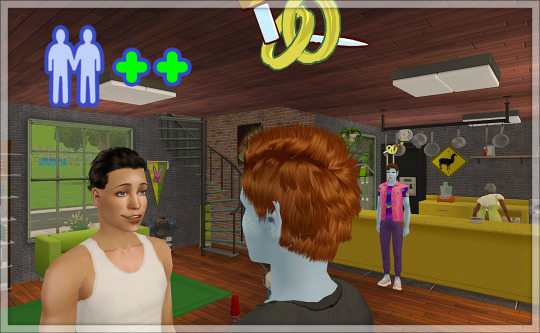
The evening finally ended well, but the next morning, things are not looking so bright. Nathaniel doesn't seem to have got the memo that Alexander is engaged now, and hazards a flirt with his crush.
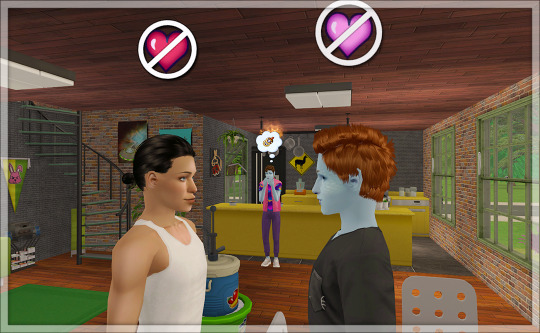
Although initially taken off-guard, Alexander soon sets him straight. (Actually, it seems that Nathaniel had more than a crush going on.)
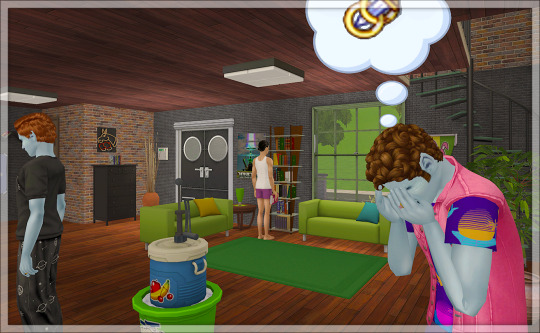
But Theophilus is a sensitive soul, and takes the misunderstanding very hard indeed.
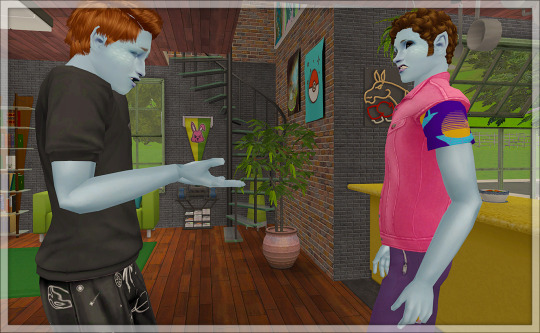
An apology just isn't enough, no matter how earnest it might be.
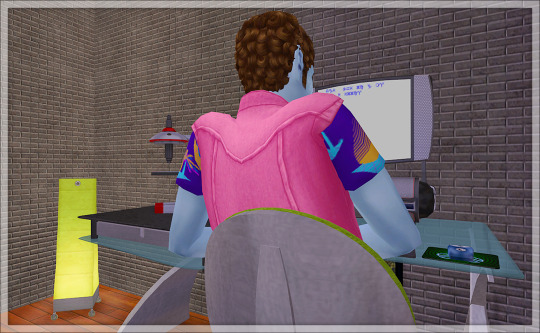
Theophilus needs some space, and throws himself into his term paper, by way of distraction.
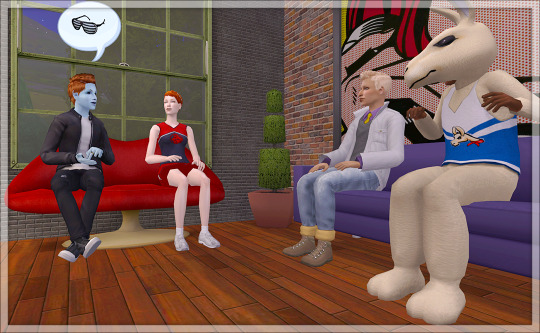
Alexander uses the time to offer some fashion tips to Llama Guy.
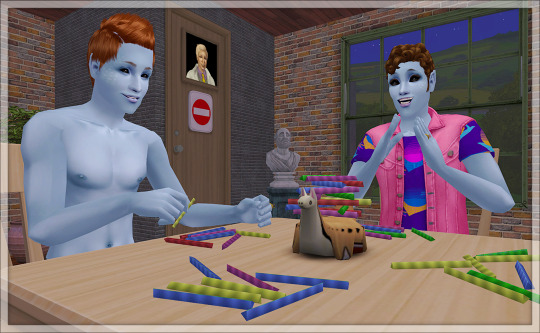
But with his term paper completed in one marathon session, Theophilus is in urgent need of some fun, and Alexander manages to convince him that their favourite game is just the thing. Maybe it will work its conciliatory magic once again?
#sims 2#gameplay#merybury#de bourgh university#alexander tilney#theophilus bertram#frederica wentworth#eleanor tilney#hester fairfax#jasper tilney#bennet tilney#sophia wentworth#thomas bertram#edward crawford#nathaniel newman#llama guy#mansfield house
11 notes
·
View notes
Text
WARLUNG Reveal New Music Video “29th Scroll 6th Verse”
~Doomed & Stoned Debuts~
By Billy Goate

Artwork by Laura Bennett
There's no denying the deep, groovy, doomy heavy rock vibe of WARLUNG on their new music video, airing the first single from their upcoming 5th studio album, 'The Poison Touch' (2025). Lyrics draw upon moments from the original Planet of the Apes movie (I'm talking the one from way back in '68), scripted by classic Twilight Zone writer Rod Serling:
Beware the beast man, for he is the devil's pawn. Alone among God's primates, he kills for sport or lust or greed. Ye, he will murder his brother to possess his brother's land. Let him not breed in great numbers, for he will make a desert of his home and yours. Shun him. Drive him back into his jungle lair. For he is the harbinger of death.
This screed was preserved in the Apes' sacred scripture, "29th Scroll 6th Verse," which is the title of this album-closer. Its truth is self-evident, generation after generation, bringing chills when you hear the words: "No way out..."
"This is an ode to classic sci-fi," the band explains. "The song warns against the destructiveness of human nature. It’s an interpretation of the Law Giver’s sacred scriptures from The Planet of the Apes lore."
Warlung's forthcoming 8-tracker is bursting with energy, made immediately recognizable by the distinctive two-vocalist approach of axemen George Baba and Philip Bennet that deliver some truly effective choruses, with delicious guitar harmonies, hell-yeah solos, and poignant riffs, backed by the stalwart and inventive rhythm section of Chris Tamez (bass) and Ethan Tamaz (drums). These two brothers bring dramatic punch to "29th Scroll, 6th Verse," making its message all the more gripping.
You can pre-order The Poison Touch starting today on Heavy Psych Sounds, with the release date slated for February 14th on multiple variants of vinyl as well as compact disc and digital (get it here). Mixed and mastered by Travis Weatherred of fellow Houston band Fostermother, whose recent album Echo Manor was lauded in these pages.
Warlung's tight, highly-charged sound and earnest vocals possess the stage, making them a must-see live, and I know Europe will be pumped to see them in the new year.
Give ear...
youtube
SOME BUZZ
Warlung is a Texas band formed by longtime friends and brothers in 2016. Their sound is an ode to classic rock and modern metal, mixing heavy riffs and catchy melodies with a psychedelic twist.
After self-releasing their debut album “Sleepwalker” in 2017, they quickly gained a cult following around Texas, opening for bands like Wo Fat and Dead Meadow. The band seemed to accept that they don’t have to stick to traditional themes and goes for more epic storytelling, helping to further expand their sound.
They wasted no time and returned to the studio to release “Immortal Portal” in 2019, becoming a local favorite to support bands such as High Reeper and King Buffalo. The band promoted their unique sound. playing notable festivals End Hip End It Fest, SXSW, Stoner Jam, Lone Star Unleashed and Ripplefest. They are renowned for their pneumonic rage, utilizing elements of true doom, stoner rock and occult-driven blues.

After signing with Heavy Psych Sounds to release “Optical Delusions” in 2020 and “Vulture’s Paradise” in 2022, they embarked on their first European tour in early 2023. Their wicked riffs, dream-like vocals and sinful solos subdue the listener into a deep state of fantasia. Touring sporadically, they continued to be included on lineups of Desert Rock Fest, Seismic Summer, and Heavy Psych Sounds Fest, sharing the stage with High on Fire, Truckfighters, Bongzilla, Weedeater, Windhand, and Brant Bjork.
Warlung is set to release their fifth studio album entitled, “The Poison Touch” and preparing for another European tour in early 2025.
'The Poison Touch' (2025) delves deeper into atmosphere while maintaining the gritty undertone that defines us. From start to finish, the listener is blasted with in-your-face raw energy while simultaneously feeling like a hauntingly beautiful experience. This record captures the essence of our live sound while exploring new realms, serving as both a continuation and evolution of our style.
Follow The Band
Get Their Music
#D&S Debuts#Warlung#Houston#Texas#heavy rock#doom metal#hard rock#stoner rock#occult rock#music video#Heavy Psych Sounds#D&S Reviews#Doomed and Stoned
4 notes
·
View notes
Text
It’s always Mr. Darcy this and Mr. Darcy that, but when are we, as a society, going to recognize that sunshine soft boy Mr. Henry Tilney also deserves fangirls screaming about him? It’s high time we start, friends—sweet baby angel unicorns have stood by long enough for the brooding, reserved men to continue reigning.
Northanger Abbey is Jane Austen’s most gothic adventure, but it’s simultaneously the sweetest. As much as many of us want to be Elizabeth Bennet (and some really are), we’re mostly Catherine Morland—the bookworms longing for more. If she were a character today, she’d be the one with a bookstagram account, championing for all kinds of stories to take up space in the romance sphere. And with that comes the softest hero. The best part of Henry Tilney as a character is his kindness, but concurrently, his humor and the ability to communicate openly.
Continue Reading
16 notes
·
View notes
Text
Not sure about international screenings but the first episode of a new three part documentary series called Jane Austen: Rise of a Genius aired on the BBC tonight.
I'd heard about it some months ago but almost forgotten about it (luckily my grandfather reminded me😅) and though it started off quite well, the first episode left me feeling disappointed.
There was just so much speculation 'Jane thought...'; at this point in her life Jane was...'' 'after this, Jane felt...' rather than being up front and honest about the fact that we don't know a great deal about her life that can be independently verified.
There was a tiny bit about her juvenilia, including The Beautifull Cassandra and Lady Susan which I appreciated. But then the focus shifted to her actual novels and... wow... I'm almost embarrassed for them at how wrong they were.
First came Northanger Abbey and they represented Catherine as a silly girl obsessed with gothic novels... despite the fact that she never actually reads them properly? That's kind of the whole joke...
They also misrepresented General Tilney entirely, portraying him as a villain who casts Catherine out of Northanger Abbey... which yes, he did (and he was wrong!) but General Tilney was misled by the true villain of the novel.... John Thorpe. Though he was not mentioned at all!
Then it was the turn of Pride and Prejudice... and ooh it was bad. Mr Darcy and Elizabeth's relationship was represented as two lovers from different classes who were 'in denial about their intense mutual attraction' and eventually overcame their respective shortcomings because 'Darcy was the only person who ever truly saw Elizabeth.' I guess Jane Bennet doesn't exist? Honestly it made me question if they'd ever even read the novel or just seen an adaptation. One of which, P&P (2005) was playing while it was discussed, and the three scenes featured were excellent boiled potatoes, proposal in the rain and bewitched body and soul... which Jane Austen totally wrote ofc...
Anyway this documentary had some lovely period scenes but when it came to actually informing its audience about Jane Austen or her novels? Failed on every count.
It contained absolutely nothing about her education (one of the very few things we know with certainty), about her disabled brother George or the rest of her family, and the boarders whom her father educated at Steventon.
There was also far too much time spent on her potential love interests including Tom LeFroy. Imo, too much meaning is always given to him because he mentioned in one of the earliest surviving letters, but he was just visiting a relative close to where Jane lived. The famous letter about her 'tears flowing' was reported as absolute earnest fact, despite the fact she was likely JOKING. If there was some great love affair, I'm sure Cassandra would've burnt any letters which mentioned him. They also brought up the man at Sidmouth who was allegedly the love of her life but died soon after and the infamous alleged proposal from Harris Bigg-Wither that was accepted one night and rejected the following morning. Both stories are family legend, there is scant credible information about either but they were presented as absolute fact.
Honestly I'm so disappointed. I hoped to be able to watch it and recommend you check it out but so much of this programme was about the men Jane Austen had very tangential links to and speculation presented as fact. I would've much rather they'd been upfront that we don't know much about Jane Austen's life, but we can get some of her perspective on contemporary events from her writing.
I wish they'd analysed the hundreds of thousands of words Jane Austen left us, rather than engaged in baseless speculation and misrepresented her novels. We might feel like we 'know' her because we love her work, but ultimately there is so little we can say with absolute certainty.
#actually i wish my grandad didn't remind me lmao#jane austen#jane austen rise of a genius#pride and prejudice#northanger abbey#i am so ??? shocked that serious academics put their names to this#also helen fielding and cherie blair JUMPSCARES#what a heinous collection of people#and they kept calling elizabeth 'lizzy' too while giving terrible takes about her#sorry you're not worthy of her nickname xo#jane austen's life
13 notes
·
View notes
Text
The Death of the Power Rangers: A Eulogy
I know it seems it may be early, or late, but I feel I need to eulogize Power Rangers for a second. Yes, I know it's not done yet. Cosmic Fury comes out in about a week, and Hasbro is planning a reboot... eventually. However, this feels like the end of an era.
I don't just mean this pre-reboot Hasbro era. As far as I'm aware, we are leading up to a 2024 where there will be essentially no Power Rangers efforts, toy or filmic, for the first time since the series started. Of course, we've come close. After RPM, Disney planned to kill the brand outright, but they still output a bizarre reissue of the original series with comic panels in 2010 before Saban rebought the brand and quickly produced Samurai for a 2011 release. Power Rangers has always seemed to find a way out of cancellation. From In Space to Wild Force to RPM, Power Rangers has, somehow, always found a way. But now, in the year's 30th anniversary, the main series's luck has finally run out. Even still, it is trying to push it's luck. Cosmic Fury seemingly only exists because of delays within the reboot.
That's probably why the Cosmic Fury suits look a bit bad. They were on a production crunch only rivaled (and probably beat) by Samurai season 1. But still, this essentially marks the death of what we've known as the Power Rangers. When it does continue, it will probably end up with a completely different feel. Yes, there will be no Sentai footage, but it will also seemingly be missing the overly earnest yet endlessly charming Tokusatsu charm in exchange for Marvel inspired cynical quipiness. This sucks even more in a year where One Piece proved that Tokusatsu stylings can work in a high budget prestige series and both work for audiences and critics alike. I would hope for better, but comments about the corporate reactions for the franchise gives me my doubts. As always, the people at the top of these companies are often the dumbest and least qualified people to make art. Support the Strikes. (Not to be overly antagonistic to Simon Bennet, we attack him to much. It's mostly the corpos up top.)
Anyways, this corporate idiocy has led to the death of a franchise that ultimately helped me through some of the darkest moments in my life. I won't get too much into it, but finding Power Rangers in my childhood was one of the few lights in my youth, alongside Bionicle and Pokemon, and it was still there through most of it. I watched SPD first, and it hooked me. I learned about the universe through reruns of Dino Thunder. After missing RPM through bad marketing, I refound it in Samurai and, while that show isn't greatest, it led me to be introduced to some of my favorite Sentai suits, the Samurai suits, and later, the Gokaiger suits. I found Sentai, and the grander world of Tokusatsu productions, around Dino Charge, finding Youtube videos on the subject. It helped that the universe was still connected. Each show is individualized, which allows me to appreciate each one on their own, but the few connections did help me to feel connected to my childhood. But now, it'll be gone soon. I haven't been the closest to it in a bit, mostly looking at Ultraman, Kamen Rider, and the original Sentai for my fix, but I did still appreciate it.
A bunch of this in my adult life came through the Lightning Collection. It gave me figures of some of my favorite series, especially since it started when I first started seriously collecting action figures. However, alongside the main series hiatus, this series seems like it will go on hiatus alongside it. This is mostly through rumors, though credible ones at that. As of right now, we have only heard about a few unannounced products, and Hasbro isn't particularly good at hiding listing leaks. The Lightning Collection feels like the perfect line to have going during a hiatus like this. It is a collector focused line not trying to tie into any current content, looking back on the past of the series in a fun, relatively inexpensive way. And Hasbro keeps lines like this up without fitting content, they make GI Joe stuff after Snake Eyes flopped, and those figures have been strongly received. However, I guess a part of this has come from fan displeasure with the line. Yes, there were some general Hasbro issues before, but the move to Vietnamese factories have hit PR hard. Yes, other lines have had complaints, but none have been on the level of Power Rangers in terms of QC issues. It is absurd, I've had to mostly drop out of the line because of it. But it is still sad to see.
This leads to yesterday. Hasbro has this super paltry segment in their Pulsecon show, on the level of series that don't have current Action Figure lines, only 20 minutes, as opposed to Transformer's 45. In which, they only talk on the show coming out in a week and 2 toys that went up for order that day. I decided to pick up the Omegas, with which I'll be mostly checking out, symbolically. I do still need to finish SPD and Dino Thunder, but for me, this feels like a nice symbolic ending. It fits for what Hasbro wants to do further in the show. A set of weird, Western exclusive suits that play on weird MMPR nostalgia. I prefer these over any of Hasbro's live action efforts so far, in terms of original suit designs, but still. It symbolically shows, to me at least, the end of the Power Rangers. The end of something important to me. It's bitter, it's a bit stupid, but it's happening anyways. Maybe the new stuff will be good, who knows. But given Hasbro's attitude towards the brand, it won't be the same. Therefore, I need to bow out in this 30th anniversary. Symbolically at least.
#power rangers#cosmic fury#lightning collection#I am really tired#Isn't it funny how everything I grew up with dies... except for Pokemon I guess
9 notes
·
View notes
Photo

In the year 2025, hearing the name Jane Austen might conjure images of Keira Knightley as Elizabeth Bennet in Pride and Prejudice, Alicia Silverstone as a modernized Emma in Clueless, or the hours you likely spent in high school English analyzing the sisters of Sense and Sensibility. But Austen is more than a teenage literature standard or an IP treasure trove, and the Morgan Library and Museum’s new exhibition, A Lively Mind: Jane Austen at 250, sets out to prove that fact. Through letters, documents, and even some of Austen’s personal effects, the show paints a full picture of the storied author—on the eve of her 250th birthday—as well as those who supported her ambitions, both during her life and following her early death. “If you were marched through Pride and Prejudice in 10th grade and that was not the right time in your life, you are retaining an idea of Jane Austen that does not serve you,” says Juliette Wells, professor of literary studies at Goucher College in Baltimore and cocurator of the exhibition. Her goal with A Lively Mind is to engage every visitor, “regardless of their prior knowledge” or opinions on Austen, and to portray her as a witty, well-rounded young woman, one who even Pride and Prejudice’s Caroline Bingley would be forced to call “accomplished.” Autograph letter to Cassandra Austen, Godmersham, June 20–22, 1808.Photograph by Janny ChiuThe show already has at least one convert: Wells’s co-curator, Dale Stinchcomb, the Drue Heinz curator of literary and historical manuscripts at the Morgan. Stinchcomb entered the world of Austen “with fresh eyes”; her humor stuck with him throughout the curation process. That side of the author is on display throughout the 51 letters within the show, mostly sent between Austen and her older sister, Cassandra. Through these letters and other artifacts, viewers are able to trace Austen’s life, from her teenage years, when she first began writing, to her lasting legacy, which has transcended the years. The exhibition begins by setting the scene with walls covered in leaf-patterned paper, a recreation of the same design that once lined Austen’s home. Set mostly chronologically, a highlight of the collection appears early on, in the form of a book filled with Austen’s teenage writings. The blank, pre-bound book was a gift from the author’s father, George—and a pricey one at that. “This is tangible evidence that Jane Austen's father supported her writing, supported her ambitions,” says Wells. That’s a major theme of A Lively Mind—the community, which aided Austen and fostered her creativity. Later, following George’s death, Jane, Cassandra, their mother, and a friend, Martha Lloyd, moved into a house in Chawton, England. There, Austen began to write in earnest. One artifact on view illustrates life in the cottage, where Austen played piano in the morning before making breakfast for her housemates. “That was her only contribution,” says Stinchcomb. “The folks in the household made sure she could carve out time for her writing.” Emma, 3 vols. London: printed for John Murray, 1816. Courtesy of The Morgan Library & Museum; Photograph by Janny ChiuElsewhere, a loan from The British Library displays multiple opinions on a draft of Emma. Living in a small village in East Hampshire, Austen had no literary circle with writerly contemporaries. Instead, she created her own workshop in the confines of her world. The document is a recording of her friends’ and family’s responses to the new work, with many comparing it to her previous novels. One family friend, Mrs. J. Bridges, prefers Emma “to all the others,” while Cassandra ranks it above Pride and Prejudice, but below Mansfield Park. Of course, Austen’s writings didn’t always remain in Chawton. Eventually, the author published six novels, with a seventh, Lady Susan, released over fifty years after her death in 1871. Many first editions of these books are on display in the exhibition, as are four unauthorized copies of Emma, printed in Philadelphia in 1816. It was this printing which helped introduce Austen’s work to the U.S., a topic Wells explores in her 2017 book, Reading Austen in America. In doing research for the book, Wells tracked down the six surviving Philadelphia copies and studied the owners. “Each one bears the marks of its readers,” says Wells. They represent those who supported Austen without the author’s knowledge, and helped spread the word of her talent to a whole new continent of fans. Opinions of Emma. Autograph manuscript, ca. 1816.From the British Library archive /Bridgeman ImagesAlberta Burke falls under a similar category, and the exhibition ends with an exploration of the American scholar and philanthropist, who spent much of her adult life collecting books, manuscripts, and documents relating to Austen. Burke, who passed away in 1975, eventually donated her extensive assemblage to the Morgan, as well as her alma mater, Goucher, in many ways making this exhibition possible. Amy Sherald, A Single Man in Possession of a Good Fortune, 2019.Collection of Lizbeth and George Krupp © Amy Sherald. Courtesy of the artist and Hauser & Wirth. Photo: Joseph HydeBefore exiting the show, visitors will see a final, anachronistic addition: A 2019 painting by Amy Sherald titled in a reference to Pride and Prejudice: A Single Man in Possession of a Good Fortune. From the very start, Wells knew she wanted to include the painting as part of the exhibition, and the work’s owners generously lent it to the Morgan for use. “I love the way it connects with the world of Austen fandom, which is increasingly inclusive, global, and reinforced by adaptations that show us a world of Austen that is not the white world that one might have imagined in past generations,” Wells says. It’s the perfect way to cap off the exhibition, to transport the viewer back into the present day—where Austen is just as influential, even 250 years after she first entered the world. A Lively Mind: Jane Austen at 250 is on display at the Morgan Library & Museum from June 6 to September 14, 2025. Source link
0 notes
Photo

In the year 2025, hearing the name Jane Austen might conjure images of Keira Knightley as Elizabeth Bennet in Pride and Prejudice, Alicia Silverstone as a modernized Emma in Clueless, or the hours you likely spent in high school English analyzing the sisters of Sense and Sensibility. But Austen is more than a teenage literature standard or an IP treasure trove, and the Morgan Library and Museum’s new exhibition, A Lively Mind: Jane Austen at 250, sets out to prove that fact. Through letters, documents, and even some of Austen’s personal effects, the show paints a full picture of the storied author—on the eve of her 250th birthday—as well as those who supported her ambitions, both during her life and following her early death. “If you were marched through Pride and Prejudice in 10th grade and that was not the right time in your life, you are retaining an idea of Jane Austen that does not serve you,” says Juliette Wells, professor of literary studies at Goucher College in Baltimore and cocurator of the exhibition. Her goal with A Lively Mind is to engage every visitor, “regardless of their prior knowledge” or opinions on Austen, and to portray her as a witty, well-rounded young woman, one who even Pride and Prejudice’s Caroline Bingley would be forced to call “accomplished.” Autograph letter to Cassandra Austen, Godmersham, June 20–22, 1808.Photograph by Janny ChiuThe show already has at least one convert: Wells’s co-curator, Dale Stinchcomb, the Drue Heinz curator of literary and historical manuscripts at the Morgan. Stinchcomb entered the world of Austen “with fresh eyes”; her humor stuck with him throughout the curation process. That side of the author is on display throughout the 51 letters within the show, mostly sent between Austen and her older sister, Cassandra. Through these letters and other artifacts, viewers are able to trace Austen’s life, from her teenage years, when she first began writing, to her lasting legacy, which has transcended the years. The exhibition begins by setting the scene with walls covered in leaf-patterned paper, a recreation of the same design that once lined Austen’s home. Set mostly chronologically, a highlight of the collection appears early on, in the form of a book filled with Austen’s teenage writings. The blank, pre-bound book was a gift from the author’s father, George—and a pricey one at that. “This is tangible evidence that Jane Austen's father supported her writing, supported her ambitions,” says Wells. That’s a major theme of A Lively Mind—the community, which aided Austen and fostered her creativity. Later, following George’s death, Jane, Cassandra, their mother, and a friend, Martha Lloyd, moved into a house in Chawton, England. There, Austen began to write in earnest. One artifact on view illustrates life in the cottage, where Austen played piano in the morning before making breakfast for her housemates. “That was her only contribution,” says Stinchcomb. “The folks in the household made sure she could carve out time for her writing.” Emma, 3 vols. London: printed for John Murray, 1816. Courtesy of The Morgan Library & Museum; Photograph by Janny ChiuElsewhere, a loan from The British Library displays multiple opinions on a draft of Emma. Living in a small village in East Hampshire, Austen had no literary circle with writerly contemporaries. Instead, she created her own workshop in the confines of her world. The document is a recording of her friends’ and family’s responses to the new work, with many comparing it to her previous novels. One family friend, Mrs. J. Bridges, prefers Emma “to all the others,” while Cassandra ranks it above Pride and Prejudice, but below Mansfield Park. Of course, Austen’s writings didn’t always remain in Chawton. Eventually, the author published six novels, with a seventh, Lady Susan, released over fifty years after her death in 1871. Many first editions of these books are on display in the exhibition, as are four unauthorized copies of Emma, printed in Philadelphia in 1816. It was this printing which helped introduce Austen’s work to the U.S., a topic Wells explores in her 2017 book, Reading Austen in America. In doing research for the book, Wells tracked down the six surviving Philadelphia copies and studied the owners. “Each one bears the marks of its readers,” says Wells. They represent those who supported Austen without the author’s knowledge, and helped spread the word of her talent to a whole new continent of fans. Opinions of Emma. Autograph manuscript, ca. 1816.From the British Library archive /Bridgeman ImagesAlberta Burke falls under a similar category, and the exhibition ends with an exploration of the American scholar and philanthropist, who spent much of her adult life collecting books, manuscripts, and documents relating to Austen. Burke, who passed away in 1975, eventually donated her extensive assemblage to the Morgan, as well as her alma mater, Goucher, in many ways making this exhibition possible. Amy Sherald, A Single Man in Possession of a Good Fortune, 2019.Collection of Lizbeth and George Krupp © Amy Sherald. Courtesy of the artist and Hauser & Wirth. Photo: Joseph HydeBefore exiting the show, visitors will see a final, anachronistic addition: A 2019 painting by Amy Sherald titled in a reference to Pride and Prejudice: A Single Man in Possession of a Good Fortune. From the very start, Wells knew she wanted to include the painting as part of the exhibition, and the work’s owners generously lent it to the Morgan for use. “I love the way it connects with the world of Austen fandom, which is increasingly inclusive, global, and reinforced by adaptations that show us a world of Austen that is not the white world that one might have imagined in past generations,” Wells says. It’s the perfect way to cap off the exhibition, to transport the viewer back into the present day—where Austen is just as influential, even 250 years after she first entered the world. A Lively Mind: Jane Austen at 250 is on display at the Morgan Library & Museum from June 6 to September 14, 2025. Source link
0 notes
Text
Double knee
SYNTHETIC MRS. HILL
SYNTHETIC MR. BENNET
SYNTHETIC LESSON
SYNTHETIC LYDIA BENNET
SYNTHETIC MR. GARDINER
SYNTHETIC SALLY
SYNTHETIC JANE NOW
SYNTHETIC MR. GARDINER'S
SYNTHETIC COLONEL FITZWILLIAM
SYNTHETIC MISS LYDIA BENNET
SYNTHETIC COLONEL FORSTER
SYNTHETIC JANE
SYNTHETIC MRS. GARDINER
SYNTHETIC LYDIA'S
SYNTHETIC LYDIA
SYNTHETIC LADY LUCAS
SYNTHETIC ELIZABETH
SYNTHETIC MAY
SYNTHETIC EARNEST
SYNTHETIC PRUDENCE
SYNTHETIC MRS. BENNET
SYNTHETIC FATHER; WICKHAM'S
SYNTHETIC DENNY
SYNTHETIC MARY
0 notes